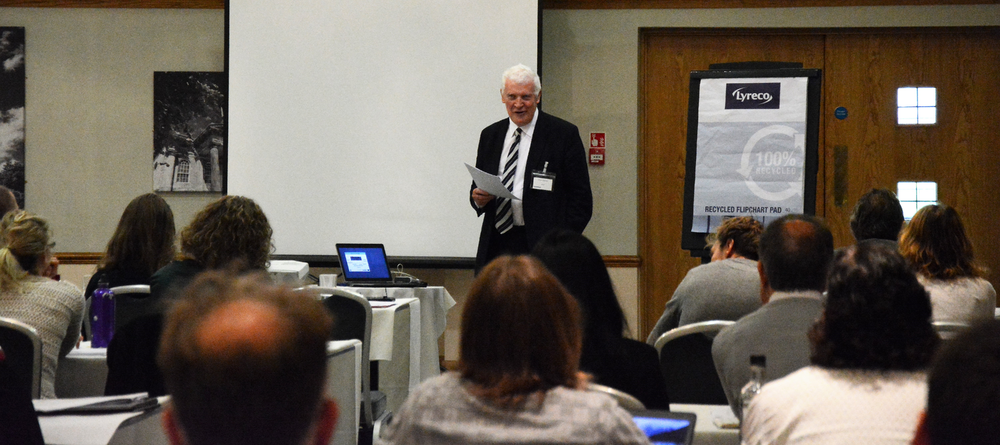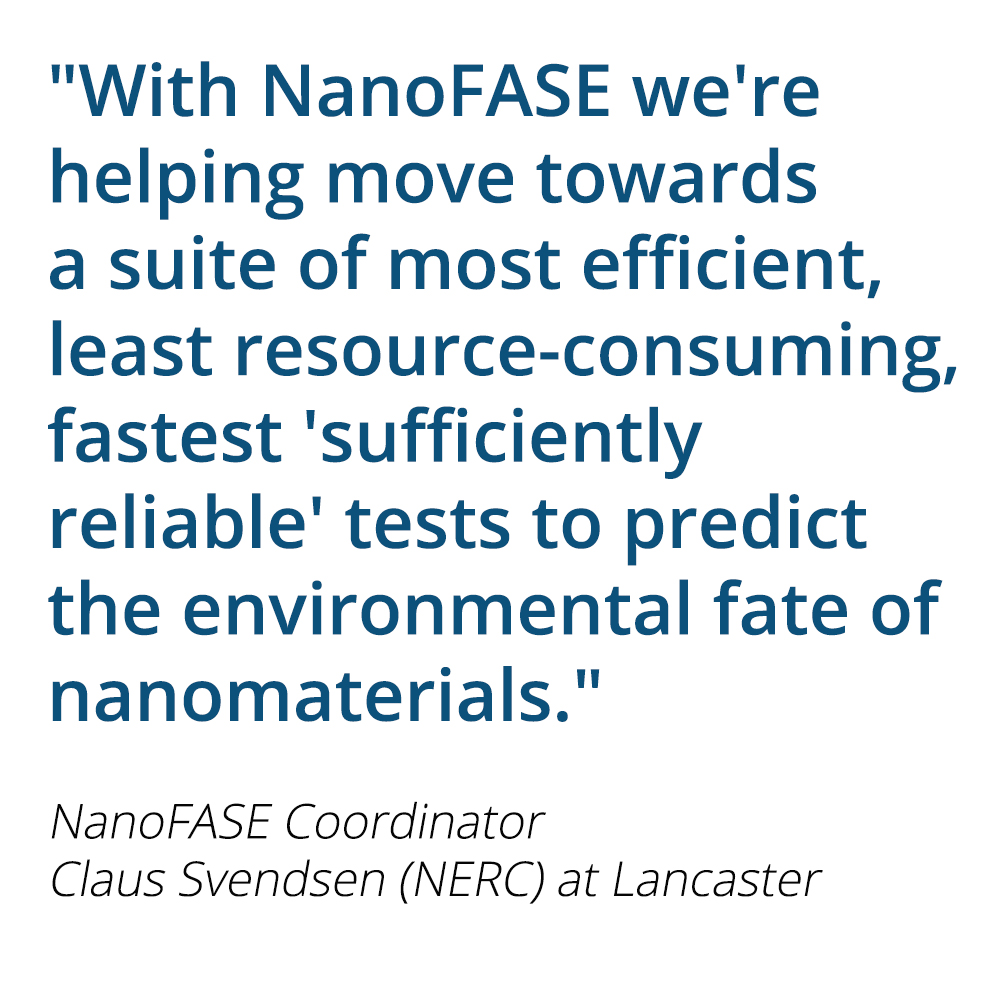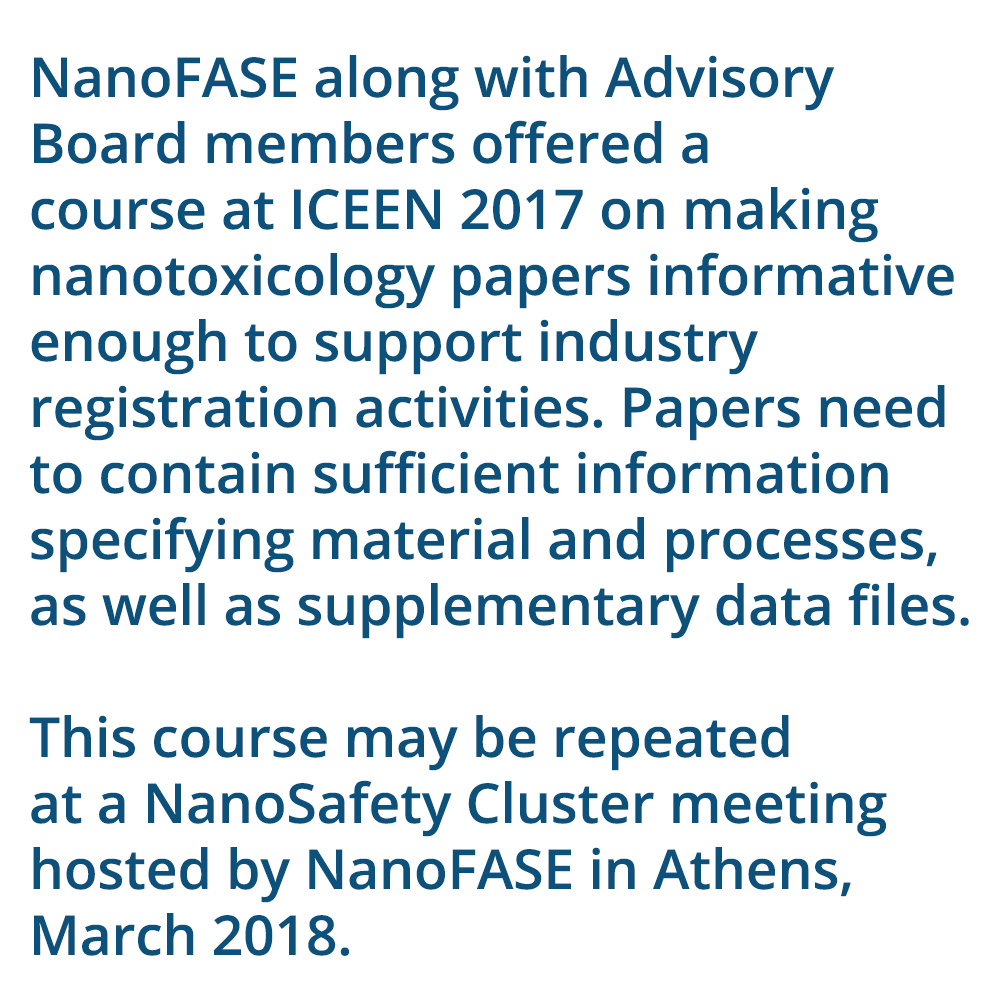A Word from the Wise
Interview with Prof. Peter Dobson OBE, NanoFASE International Advisory Board Chair

Peter Dobson addressed the NanoFASE plenary from his position on the cusp of academia and industry. He urged the scientists to develop a good relationship and dialogue with industry actors, both those who fabricate nanoparticles in quantity and those who manufacture nano-enabled products. He called industry views vital to "figuring out what needs to be characterized at the pristine level where the nanoparticle is supplied and at various levels of usage so that we can monitor what happens to these materials when they get out there" into the environment.
 Peter highlighted different types of monitoring that interest industry, including: functional performance of material, checking it's fit for purpose; and any parameter indicative of toxicity, checking the potential for environmental and health impacts. Following up with our Newsletter editor Peter's start-up mentality was on display: "We should have the ambition to move away from the measure of cell death which takes a Petri dish culture or even animal tests, to something you could put on a lateral flow strip – to test right away if the functional material is or isn't toxic. You would get a quick visual representation 'is it there or not' without complex electronics. You should want to put the animal test on a strip to put it bluntly. That could save a lot of money and reduce animal testing, make it quicker and easier to screen, and you could commercialize it. This is a huge challenge because it raises questions about the fundamental causes of toxicity to different life forms…is there a global general toxicity test?"
Peter highlighted different types of monitoring that interest industry, including: functional performance of material, checking it's fit for purpose; and any parameter indicative of toxicity, checking the potential for environmental and health impacts. Following up with our Newsletter editor Peter's start-up mentality was on display: "We should have the ambition to move away from the measure of cell death which takes a Petri dish culture or even animal tests, to something you could put on a lateral flow strip – to test right away if the functional material is or isn't toxic. You would get a quick visual representation 'is it there or not' without complex electronics. You should want to put the animal test on a strip to put it bluntly. That could save a lot of money and reduce animal testing, make it quicker and easier to screen, and you could commercialize it. This is a huge challenge because it raises questions about the fundamental causes of toxicity to different life forms…is there a global general toxicity test?"
Dobson is convinced that the graduate students in particular – and the science itself – will benefit from "dialogues with the people who have been there, done that". To build process awareness, "you don't need to spend time on the factory floor but talk to the managers at least once or twice to see the process flow diagram with temperatures, pressures and other important parameters which have implications."
Is there any reason why academics would resist talking to industry? we asked Peter. His humorous reply: "Feeling of superiority? Challenging their authority? Honestly if so, they've got to get over it. People in industry know about the risks much more – it's true of everything. They're handling larger volumes of solvents and dangerous gases than any academic would. On everything concerning industry you should be taking industry's view first and challenging the academics to provide solutions." Peter has encouraged NanoFASE scientists to meet with receptive companies, and tell them "'We need to know from your perspective – what are the worries for the future?' Regulation, waste reduction, safety procedures… Industry means two things here: the raw material suppliers and processers, and the actual end-users. All along the supply chain they have different needs. A seller wants to know whether end-of-life recycling is needed. 'If I need that process instead of incineration what are the issues?'
 Peter Dobson also pointed to another detailed source of industry information – urging scientists to take a leaf from the book of patents. "For grad students reading patents is invaluable because you have to give much more information in the patent than you would in a paper. By going to a patent you see the sort of info that is important for industry to make that stuff. They're quantifying quite exactly what they do, and they're listing all of the elements and features in the mixture. And that isn't commonly done in scientist's academic papers; it's not even done in supplementary information. I think we need to copy a little bit of what happens in the patent world because the regulators are beginning to pick up on that. If we got more accustomed to giving that level of detail in project reports they would be much more useful. You could go back later and say 'these tests were run on particles with the following specification'". Professor Dobson gives courses on how to read and navigate patents ("Some of the big companies put in smokescreens!").
Peter Dobson also pointed to another detailed source of industry information – urging scientists to take a leaf from the book of patents. "For grad students reading patents is invaluable because you have to give much more information in the patent than you would in a paper. By going to a patent you see the sort of info that is important for industry to make that stuff. They're quantifying quite exactly what they do, and they're listing all of the elements and features in the mixture. And that isn't commonly done in scientist's academic papers; it's not even done in supplementary information. I think we need to copy a little bit of what happens in the patent world because the regulators are beginning to pick up on that. If we got more accustomed to giving that level of detail in project reports they would be much more useful. You could go back later and say 'these tests were run on particles with the following specification'". Professor Dobson gives courses on how to read and navigate patents ("Some of the big companies put in smokescreens!").
Professor Peter Dobson, Chair of the NanoFASE International Advisory Board, was the Strategic Advisor on Nanotechnology to the Research Councils in the UK (2009-2013). As founding Academic Director of Oxford University's Begbroke Science Park, he initiated new research institutes that combine University activities with company R&D, and led a team facilitating the rapid transfer of technology and knowledge. "No one knows more about spinning out companies than Peter" remarks WP1 leader Alison Crossley. An Emeritus Fellow of Queen's College, Oxford as well as former Senior Principal Scientist at Philips Research laboratories, Peter delivers graduate courses and continues innovative entrepreneurship in the areas of biosensors and nanotechnology (especially medical applications). Professor Peter Dobson was awarded the Order of the British Empire (OBE) in 2013 in recognition of his contributions to science and engineering.
